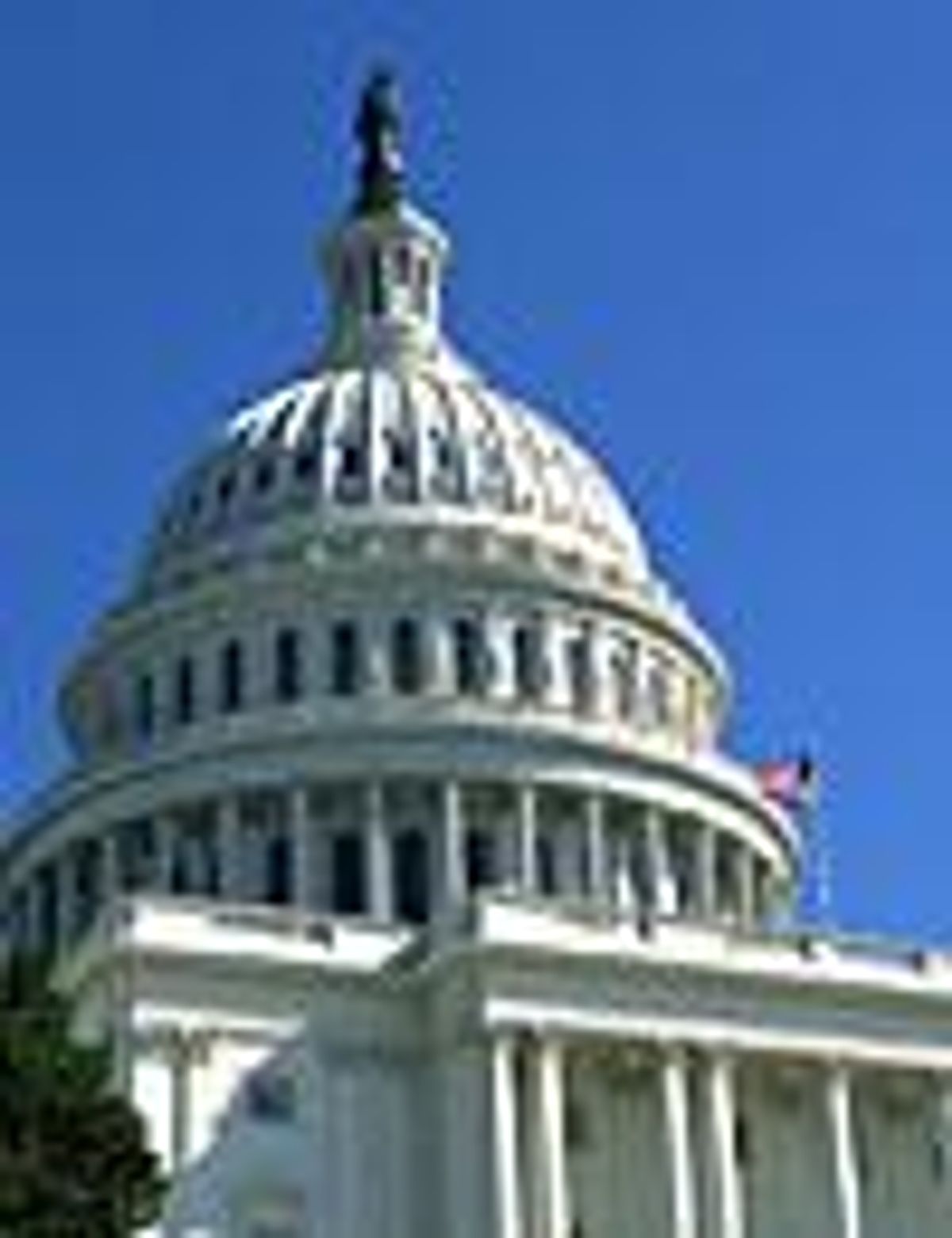Republican
control of Congress is on the line Tuesday in an election
colored by voters' dismay over the Iraq war and misbehavior
in Washington. At stake in the midterm election were
all 435 House of Representatives seats, 33 in the
Senate, 36 governor's offices, ballot measures on
same-sex marriage, embryonic stem cell research, the minimum
wage, and more--plus the overarching fate of President
George W. Bush's agenda in the last two years of his presidency.
In a climate inhospitable if not toxic for
incumbents, Democrats hoped finally to avenge the rout
that drove them from legislative power in 1994. Even
their opponents conceded Democrats were certain to make
gains, and despite brave words for public consumption,
Republicans worried that control of the House would
slip from their hands.
Even Senate control was up in the air, but
tougher for Democrats to win. Unsurprisingly, the
chairmen of the Democratic and Republican parties
talked optimistically as voters went to the polls Tuesday.
''I believe we're going to defy the experts and
maintain our majority in the House and the Senate,''
Republican National Committee chairman Ken Mehlman
said on CBS's The EarlyShow. Countered Howard Dean, his Democratic
opposite number: ''If you want change, we can give you change.''
Voting began in New York at 6 a.m., and many
states opened their polls at 7 a.m. local time. Bush
flew to his home state of Texas to vote Tuesday,
finishing a restrained five-day round of campaigning mostly
in Republican strongholds. His presence was a mixed
blessing for candidates attracted to the attention and
fund-raising prowess generated by a president but
nervous about being associated too closely or even seen with
an unpopular leader.
Charlie Crist, a Republican running to succeed
Bush's brother Jeb as Florida governor, did not show
up for a planned appearance with Bush in a safely
Republican section of Florida's panhandle, an embarrassing
snub on the eve of voting. Bush gamely pressed on with
lacerating attacks on Democrats at that Pensacola
rally of 7,000 vocal supporters. ''The Democrat
philosophy is this: If it breathes, tax it, and if it stops
breathing, find its children and tax them,'' Bush shouted.
Former president Bill Clinton responded sharply
in kind. ''They can't run anything right,'' he said,
taunting Republicans about Iraq, Hurricane Katrina
recovery, and scandal in Washington.
Democrat Jim Webb, a former Navy secretary,
author, and less than smooth campaigner, invited
Clinton to be at his side to close out a Virginia
Senate campaign he was given little chance of winning at the
outset. His tight race with Sen. George Allen became
emblematic of unexpected Democratic opportunities in
state after state.
''I have a strong feeling that on Wednesday
morning the White House is going to wake up and look
across at the Capitol dome and say, 'We got a
problem,''' Webb told a crowd pressed into a Roanoke firehouse.
White House press secretary Tony Snow, appearing
on Rush Limbaugh's radio show, argued that the
Democrats' only stance is ''literally running around
and heckling the president rather than trying to think
seriously about how to deal with Osama bin Laden or a
global war on terror.''
''You gotta wonder if they're a serious
political party,'' Snow said. He also criticized a
Democratic proposal for dealing with the Iraq war by
saying, ''We do, quote, phased redeployment, what we do is
we invite a whole lot more September 11s.''
Democrats needed to gain 15 seats for a majority
in the House and or six for control of the
Senate. A majority in either chamber would
give them a stronger voice against a war that has cost
more than 2,800 U.S. lives and has come to be seen by
most Americans as misbegotten. Sharply critical of
Bush's prosecution of the war throughout the campaign,
Democrats nevertheless lack a common position on how to get
the United States out.
Both parties sent thousands of volunteers to
competitive districts to mobilize voters and assembled
legal teams to watch for irregularities in balloting
systems that continue to be error-prone six years after the
hanging-chad debacle of 2000. The Justice Department sent a
record 850 poll watchers to 69 cities and counties to
safeguard against fraud, discrimination, or system
malfunctions in tight races.
Republicans have been the acknowledged champions
at getting supporters out to polling stations, a
critical skill in midterm elections, when turnout is
typically low, around 40%, and one that heightened suspense
over which party would hold the levers of power at the end
of the counting.
Evangelical conservatives are the foundation of
that mobilization and motivation drive, but their
enthusiasm was in question as they faced the prospect
of a president too politically weak to take forward their
agenda and looked back on a campaign tainted by the
congressional page sex scandal and more.
Even so, some final opinion polls indicated a
tightening race; others suggested the Democrats were
still far in front in national sentiment. At least two
dozen Republican House seats were at risk. Among
Republican-held open seats, those in Arizona, Colorado, New
York, Ohio, and Iowa seemed most vulnerable.
Republican representatives John Hostettler, Chris
Chocola, and Mike Sodrel of Indiana; Charles Taylor of
North Carolina; Curt Weldon, Don Sherwood, and Melissa Hart
of Pennsylvania; and Charles Bass of New Hampshire
were in particularly difficult reelection struggles.
In Senate races, Republican incumbents Mike
DeWine in Ohio and Rick Santorum in Pennsylvania
appeared to be in deepest trouble, with Lincoln
Chafee in Rhode Island and Conrad Burns in Montana
somewhat less so.
Rep. Nancy Pelosi
of California, in line to become the first woman
speaker of the House in history if Democrats win, was in
Washington after a weekend of campaigning for
candidates in Pennsylvania and Connecticut.
The campaign's final hours brought fresh
evidence of the enormous cost. Spending by the two
national parties surged in the final week as Democrats
and Republicans invested in television commercials designed
to sway the outcome in more than 60 House races and 10
Senate contests. In all, the two parties have spent
about $225 million thus far in campaign activities
independent of the candidates themselves. (Calvin Woodward,
AP)




















































































